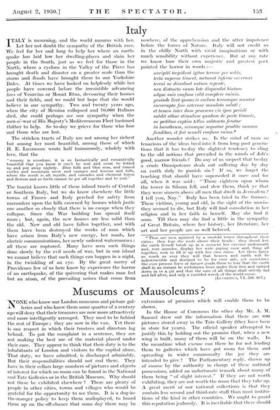Italy
ITALY is mourning, and the world mourns with her. Let her not doubt the sympathy of the British race. We feel for her and long to help her where an earth- quake has laid low her dwelling-places and slain her people in the South, just as we feel for those in the North, where a cyclone in the Valley of the Piave has brought death and disaster on a greater scale than the storm and floods have brought them to our Yorkshire Dales. At times we have looked on helplessly while her people have cowered before the irresistible advancing fires of Vesuvius or Mount Etna, devouring their houses and their fields, and we could but hope that she would believe in our sympathy. Two and twenty years ago, when the city of Messina collapsed and 70,000 Italians died, she could perhaps see our sympathy when the men-o'-war of His Majesty's Mediterranean Fleet hastened thither to help. So to-day we grieve for those who lose and those who are lost.
The stricken tracts of Italy are not among her richest but among her most beautiful, among those of which H. E. Luxmoore wrote half humorously, wholely with love, that the
"scenery is overdone, it is so fantastically and romantically beautiful that you know it can't be real and must be folded up and put away nightly. Blue hills and blue seas, and ruined castles and mountain snow and oranges and lemons and Mils, where the scrub is all myrtle, and cascades and chestnut forest and flowers and so forth cannot be got all together and be real."
The tourist knows little of these inland tracts of Central or Southern Italy, but we do know elsewhere the little towns of France and Italy perched for safety from marauders upon the hills crowned by houses which jostle one another so closely that there is no escape when they collapse. Since the War building has spread itself more ; but, again, the new houses arc less solid than the old. New and old have fallen together, and with them have been destroyed the works of man which have arisen from Italy's new energy, her roads, her electric communications, her newly ordered watercourses : all these are ruptured. Many have seen such things done slowly by the evil needs of war, but in our island we cannot believe that such things can happen in a night, in the twinkling of an eye. By the great mercy of Providence few of us here know by experience the horror of an earthquake, of the quivering that makes man feel but an atom, of the prevailing noises that come from
nowhere, of the apprehension and the utter impotence before the forces of Nature. Italy will not credit us in the chilly North with vivid imaginations or with much sensibility without experience. But at any rate we know how their own majestic and greatest poet painted the horror in words :—
ancipiti trepidant igitur terrore per nags, tecta superne timent, metuunt ittkrne cavernas terrai ne dissoluat 'whim repente, nett distraeta suites late dispandat hiatum adque suis confuse edit eomplere proinde lied quamris dictum terramque reautur incorrupta fore aeternae mandata saluti ; et Minim inter dues praesens ris ipso peridi subdit athuc stimulant quadant de parte timoris, lie pedants raptim tellus subtraeta fi•ratur in barathrunt, rerumque sequatur prodita summa fiinditus, et fiat mundi confisa mina.*
Another wonder strikes us. Is the mind of man so tenacious of the ideas bred into it from long past genera- tions that it has to-day the slightest tendency to cling to the old notions that prevailed in the minds of Job's good, narrow friends ? Do any of us suspect that to-day a crude Omnipotence deals out suffering day by day on earth duly to punish sin ? If so, we forget the teaching that should have superseded it once and for all, when it was said : " Those eighteen upon whom the tower in Siloam fell, and slew them, think ye that they were sinners above all men that dwelt in Jerusalem ? I tell you, Nay." Italy has been tried in the furnace. These victims, young and old, in the sight of the unwise they seemed to die, but Italy will find consolation in her religion and in her faith in herself. May she find it soon. Till then may she find a little in the sympathy of Great Britain, where her history, her literature, her art and her people are so well beloved.
• Thus are men agitated by a twofold terror throughout thwir cities ; they fear the roofs above their heads: they dread lest the earth herself break up in a moment her caverns lemeath and, rent asunder, display her wide gaping maw and, flung all together, seek to fill it up with her own ruins. Let them fancy so much as ever they will that heaven and earth will he indestructible and destined to be for ever safe, yet sometimes the ever present force of danger goads theni to fear that the earth shall in an instant be withdrawn from under their feet and carried down in to a pit and that the sum of all things shall utterly fail and fall after, and only a tumbled wreck of the world ensue. (Lucnkrius, VI. 596-607.)
































 Previous page
Previous page